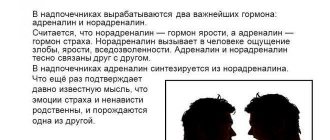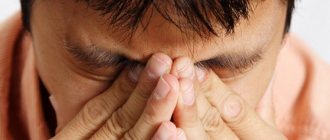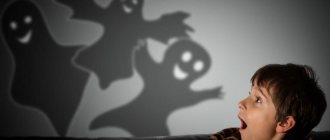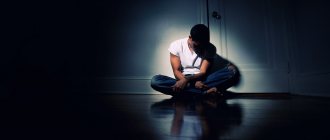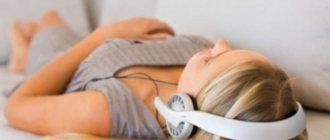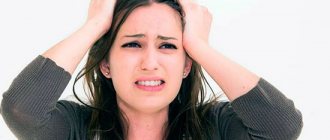What is fear?
Fear is a negative emotion that occurs when danger occurs or is expected, regardless of whether it is real or imagined. The state of fear is divided according to intensity into anxiety, confusion, excitement, worry, fear, panic.
It is important to distinguish between fear, as a manifestation of the body’s normal reaction in response to a real threat, and fear that cannot be explained. Irrational anxiety requires adequate treatment so that it does not become chronic.
Reasons for fear of public speaking. Children's phobias
There are different types of excitement on stage. But many people fall into approximately the same state, which is quite difficult to overcome: the audience turns into a frightening crowd, the voice sounds like it is not their own, their mouth becomes dry, their knees and hands shake. To understand how not to worry before a performance and overcome fear, you need to find out the reasons for its occurrence.
The first of them begins in childhood and is the most underrated. When a small child speaks loudly for the first time in a public place, one of the parents silences him. Subsequently, this turns into a phobia and the person, on a subconscious level, begins to be afraid of loudly expressing his thoughts in front of an audience.
When a speaker's voice tightens, it causes anxiety and ultimately leads to fear. School teachers who belittle skills and classmates who can easily hurt the speaker’s feelings without thinking about the consequences can easily add fuel to the fire. All this provokes the emergence of social phobias and fear of performing on stage.
Main indications for taking medications
Anti-fear medications are designed to relieve anxiety, slow down nervous system processes, restore intercellular metabolism, normalize blood circulation and eliminate muscle spasms.
Regardless of the mechanism of action, they all have a number of common indications for use:
- Sleep disorders, insomnia.
- Constant anxiety.
- Chronic fatigue.
- Hyperexcitability.
- Obsessive thoughts, phobias.
- Various types of neuroses.
- Signs of reactive psychosis.
- Autonomic disorders.
- Involuntary twitching of body parts, tics.
- Epileptic seizures.
Each medicine helps to cope with certain types of fear, so only the attending physician can choose the most suitable remedy.
What will help you calm down before a performance?
Famous musicians and speakers recommend several breathing exercises that will help you relax and overcome the fear of performing. Take a deep breath, count to three, and then exhale and repeat this 10 times. To remove unnecessary thoughts from your head, you should think about what awaits the speaker after the event - applause, compliments, a delicious dinner, a relaxing bath.
This encourages and gives rise to the desire to perform rather than run from the stage. You will still have to have something light to eat; it is not recommended to perform on an empty stomach - usually malnutrition makes itself felt at the wrong time. This will make you nervous and want to satisfy the need rather than put all your effort into the performance.
Just before going on stage, do a few exercises to cope with anxiety:
- Breathing exercises are very effective. First you need to take a few deep breaths, and then alternately close one nostril and breathe in the second. It is important to imagine that calm and confidence are entering your lungs with air, and tension and fear are being exhaled.
- Warm-up of the whole body is useful. You need to take a deep breath and, as you exhale, straighten everything possible - your back, neck, arms, fingers. Be sure to stay in this position for a few minutes and then slowly sit down and relax.
- So that people are not afraid of a too tight smile and tightening of the facial muscles, you can do this simple action: lower your head and gently shake it from side to side. After a couple of minutes, the facial muscles will relax.
Remedy for Fear
Medicines for fear include not only tranquilizers and antidepressants. Doctors prefer to start treatment with milder drugs, to which addiction rarely occurs.
Herbal preparations
For mild anxiety and sleep disorders, doctors prescribe gentle medications based on plants that have a mild sedative and calming effect. These include mint tablets, tinctures of valerian and motherwort, and collections of soothing herbs.
Among the complex herbal remedies, Persen and Novo-Passit are distinguished. These medications calm the central nervous system, help cope with anxiety, increased excitability and fear, and also normalize sleep and improve mood.
Nootropics
The action of nootropic drugs is aimed at normalizing metabolism and restoring blood circulation in the brain. Due to this action, nootropics stimulate the functioning of the nervous system, improve mood, and increase concentration.
To relieve symptoms of fear, the following drugs are most often prescribed:
- Piracetam. The anti-anxiety effect is achieved by normalizing blood circulation in the vessels of the brain.
- Phenotropil. Increases the nervous system's resistance to stress, restores sleep, increases physical and mental activity
- Semax. Promotes adaptation to extreme situations, improves psycho-emotional state, normalizes the functioning of the central nervous system.
- Phenibut. Reduces or completely reduces feelings of anxiety, prevents the development of depression and phobias, normalizes sleep, and has a mild anticonvulsant effect.
- Picamilon. It has a mild anti-anxiety, tranquilizing and psychostimulating effect.
In combination therapy for fear that occurs as a result of injuries or persistent neurological disorders, drugs with nootropic effects in injections are often used - Cerebrolysin, Actovegin, Cortexin.
Homeopathic medicines
Homeopathy drugs effectively cope with all types from mild anxiety to phobias and panic attacks. Initially, they only relieve symptoms, but with prolonged treatment they can achieve complete recovery.
Homeopathic remedies and their main indications:
- Etuza. Visual hallucinations, restlessness, tearfulness.
- Ambergris. Increased excitability, tendency to hysteria, overwork, insomnia.
- Anacardium. Depression, stress, obsessive movements and thoughts.
- Argentum nitricum. Hypochondria, impulsiveness, hidden anxieties.
- Arnica. Fear of open spaces, insomnia, mental stress.
- Aurum. Fear of death, depression, intolerance to loud sounds.
- Calcarea carbonica. Anxiety accompanied by tachycardia, night terrors.
- Iodum. Unreasonable fears, mental anxiety.
To choose the right medicine, the homeopath assesses the state of the person’s psycho-emotional state, as well as the presence of somatic diseases.
Biologically active additives
Dietary supplements, unlike medications, cope only with mild anxiety and fear that arises before upcoming events. Most dietary supplements contain extracts of valerian, ginseng, motherwort, lemon balm, hops, eleutherococcus, and chamomile. They should not be considered as the only medications for anxiety, but can be used as complementary treatments.
Among dietary supplements, there are products containing amino acids - Glycine, Tryptophan, L-Arginine. They are considered neurotransmitters, antioxidants and stabilizers of mental processes, which allows you to achieve quick results without consequences for health.
How to overcome stage fright
You may convince yourself that public speaking is useful, and your phobia will partially subside, but the fear will not go away. There is no need to fight it, it has to be there for the audience to get a return from you. Another question is that fear needs to be controlled and the right ways to overcome it must be known. After all, if you are very nervous, it will ruin the report. Let's look at some tips to help you manage your performance anxiety:
- Take proper time to prepare for your presentation. You must understand what you are saying, that is, under no circumstances should you make your knowledge of the text automatic, since you will automatically forget it in case of stress. Thoroughly study the topic of the speech, get into the essence for a deeper understanding. In addition to what to say, you must clearly know how to say it. And you shouldn’t think that no one is working on this aspect. On the contrary, the more a person has to perform in public, the more he understands how important it is to rehearse every step in order to feel confident on stage. Conventional rule: 1 minute of speech is equal to an hour of work.
- Fearless public speaking should be done at a moderate pace to keep breathing even. If you jabber, the audience will think that you are not interested in the topic and want to get rid of an uncomfortable speech as soon as possible. Pronounce consonants and vowels clearly, without swallowing. It is important to rid your speech of words of parasites, especially those that slip into pauses. Leave pauses as if they were intended, otherwise it will seem like you forgot something.
- You must know in advance what audience you are speaking to. What information will interest them, what do they expect from this performance - take this into account when preparing so that the audience is involved in the process. Any topic can be covered from different angles, and you need to choose the one that will be relevant to the audience. Ask the event organizers for guest lists in advance, study what areas of activity they work in, connect your topic with their work, and formulate the main points of the speech.
- To create a comfortable atmosphere for yourself and the audience, create a dialogue before starting your speech. Talk with those present about abstract topics. Once you feel that contact has been established, you can smoothly move on to presenting information. This way you will stop worrying and the audience will feel relaxed.
- Change your mentality and ask yourself the question: “Why am I standing on stage now?” When your attention is turned to yourself, i.e. thinking about how you look, how your voice sounds, etc., you begin to worry. If you catch yourself thinking such thoughts, then think, are you here to show off yourself or to present information useful to the audience? This attitude will help cope with a groundless phobia.
Pills for fear
The choice of most people prone to anxiety is oral forms of drugs in the form of capsules, tablets or pills. They are convenient to carry with you, allowing you to take the medicine at the first sign of anxiety.
Valerian
Valerian is the most popular anti-fear pill, but its use is only effective for mild disorders. The action of Valerian in tablets is to suppress the nervous system, improve sleep, relax muscles and normalize the heartbeat.
Note! The effect of tablets based on valerian extract is achieved with regular use. Improving your condition after a single dose of one tablet is nothing more than self-hypnosis.
Passionflower incarnate
Passionflower was initially used exclusively as a remedy for insomnia, but upon careful study, other properties of the plant were identified that help fight fear:
- Relaxes the nervous system.
- Relieves tension.
- Improves mood.
- Has an anticonvulsant effect.
- In large doses it is a tranquilizer.
Medicines with passionflower are available in tablets, capsules, liquid extract, and you can also buy the herb of the plant in bulk or in filter bags in pharmacies.
Motherwort extract tablets
Motherwort tablets are indicated for disorders of the autonomic nervous system, insomnia, muscle spasms, increased nervousness and arterial hypertension. In addition to regular tablets, there is Motherwort Forte, which contains an increased content of motherwort and magnesium. This combination allows you to quickly restore the functioning of the nervous system and achieve the desired effect.
St. John's wort preparations
Medicines for phobias, fear and depression have been created based on St. John's wort. Such drugs have a positive effect on the central and peripheral systems, promote normal sleep, suppress apathy, and improve the psycho-emotional state.
St. John's wort is present in the following products: Negrustin, Neuroplant, Deprim, Hypericin. Each medicine contains various auxiliary components that enhance the effect of St. John's wort.
Peony extract
Tablets called Peony extract are prescribed mainly for autonomic disorders accompanied by panic attacks. They combine well with sedative and antispasmodic drugs, enhancing their effect. But anti-fear remedies with peony are contraindicated in combination with drugs that stimulate the central nervous system, as they weaken their effect.
Features of sedatives
Sedatives mean substances of plant and synthetic origin (sodium bromide, potassium bromide). They reduce emotional stress without a hypnotic effect, however, with increasing doses, they help facilitate the onset of sleep and make it deeper.
Sedatives, as a rule, are well tolerated and rarely cause side effects and do not cause chemical dependence. Therefore, most of these fear pills are sold in pharmacies without a prescription. However, to achieve a noticeable improvement in mental state, a long course of treatment without interruptions is required. Sedative medications based on herbal components are considered the safest.
Directions for use and doses
It is not recommended to take medications that act against fear without the advice of a specialist - a psychologist, psychiatrist or neurologist. To achieve the desired effect, you must first identify the cause of anxiety, its severity and the presence of concomitant diseases.
Not only the medicine is selected individually, but also the dosage, duration of use and number of courses. If during therapy adverse reactions occur, an allergy appears or the condition worsens, the therapy regimen is adjusted by reducing the dosage or replacing the drug with another medicine.
Attention! If a person decides to undergo treatment without consulting a specialist, it is better for him to choose drugs based on medicinal plants, having first studied the instructions for use.
Contraindications
Each anti-fear medicine belongs to a specific pharmacological group, differs from other drugs in composition and mechanism of action, and, accordingly, has contraindications for use and age restrictions.
It is customary to identify general contraindications:
- Individual intolerance to components.
- Severe pathologies of the liver and kidneys.
- Uncontrolled cardiovascular pathologies.
- Pregnancy and lactation period.
- Shock and precomatose state.
- Neuroinfectious diseases.
- Angle-closure glaucoma.
Relative contraindications include: suicidal tendencies and persistent brain disorders. In these cases, hospital treatment under the constant supervision of specialists is recommended.
Make sure you don't look nervous
Speakers who watch videos of their speeches almost always say, “Wow, I don’t look nervous, even though I felt that way.” “Remember, the public doesn’t see how you feel. They just see how you look and act,” Price says. When, as a speaker, you speak calmly and confidently (or at least pretend that you feel that way), you earn yourself a lot of points: they believe you, the public likes you. “When you are able to control your nerves, take the microphone and create a connection with the audience, you increase your career opportunities many times over,” Price concludes.
Source: pronetworking.ru
Doping and high art are a taboo topic. However, after modern management burst into classical music, not only professional, but also pharmacological terms are increasingly heard behind the scenes. The concert conveyor forced the musician to live at a crazy pace: today he’s touring in Tokyo, tomorrow in Vienna, the day after tomorrow recording in a prestigious studio, and so on without stopping. At the same time, the highest class of performance and the proverbial soul are still expected from the musician. Nobody has any idea where to get it from with such a dog’s life. Maybe at the pharmacy?..
One tablet is enough
It is curious that during the mini-survey conducted on this topic by Itogi, literally all respondents understood exactly what was going on. And with knowledge of the matter they sprinkled in the names of medications, immediately adding, however, that they themselves are a no-no. And friends too, no, no. Although in general, of course, in world practice it happens...
According to graduates of music universities, students there openly take “magic” pills before exams, which can be bought at any pharmacy. When asked why this topic is not discussed anywhere, young musicians calmly answer: “We don’t talk about it because no one asks us about it.” In online directories about this medicine they write that it is part of the group of beta-blockers, in other words, it is a cardiovascular drug that is indicated for arrhythmias, high blood pressure, migraines or, for example, in the post-infarction period. However, there is an opinion: a musician gets nervous before a concert - produces adrenaline - takes a pill - blocks adrenaline. And calm as an elephant he comes out to the public. What determines the choice? The operating neurosurgeon, candidate of medical sciences Soslan Medoev, told Itogi about this. This pill really relieves jitters - it has a depressing effect on the psyche, but does not affect fine motor skills, so important for classical musicians, and reliably blocks receptors from the action of adrenaline - that is, it calms a racing heart and tension.
Naturally, the medicine has a long list of contraindications, and those who are “hooked” on the drug may experience side effects such as nightmares during sleep, increased fatigue, confusion and even – horror of horrors! - decreased ability for rapid motor reactions. And in case of an overdose, bradycardia and other misfortunes are possible. It can hardly be called a real cure for fear - there are much stronger drugs for this purpose, for example MAO inhibitors. But they have a more pronounced sedative effect, in other words, performers taking them can easily doze off right on stage.
Oh Bach, you are a sport
It’s clear that no one wants to fall asleep during their own solo. He would be glad not to be afraid of the public, but the performer of classical music is a reverent person, with a fine mental organization. I tend to perceive any performance as the most important thing in life. This is all because the training cycle for a violinist and pianist is, on formal grounds, similar to the training of an athlete. Instead of a carefree childhood - seven or eight years of music school. Then three or four years of school. Then five years of hellish work at the conservatory. And all these years, in order to achieve professionalism, the musician “rapes scales” for six to eight hours a day.
And not everyone can boast of the iron nervous system of Svyatoslav Richter. He could enter a crowded Barbican Hall with a high fever and in a terrible mood. And play a brilliant solo concert. Without flinching.
However, most often the musician is nervous before a concert. And sometimes he panics. At the latest Richter Competition, pianist Sergei Kasprov attracted attention from the very first round. Filigree technique and taste for the game destined the competitor for at least a prize. However, Kasprov did not reach the finals: he could not calm down the competitive jitters - he completely forgot fragments of the musical text. In an extreme situation, a breakdown can happen to anyone at any time.
Help the pianist
The exhausting conveyor belt of tours, recordings, and festivals for foreign musicians began earlier than for domestic ones. A couple of years ago, a documentary was released about the Berlin Philharmonic Orchestra's tour under the direction of conductor Sir Simon Rattle (A Trip to Asia, directed by Thomas Grube).
In front of the camera, the horn player of this orchestra talked about how he drinks a glass of beer before a concert in order to calm his panic. The authoritative German Association of Orchestra Players, which numbers 9 thousand people, immediately responded: the musicians called psychologists for help. Today, in Germany, the problem of jitters is being studied by special institutes. Professor Helmut Möller from the Berlin Institute for Musicians' Health generally estimates that "25-30 percent of musicians regularly take pills or alcohol to overcome stage fright." And our rumor left memories of the great pianist Vladimir Sofronitsky, drinking a bottle of cognac during a wildly virtuoso concert. However, conductor Felix Korobov assured Itogi that a cantina buffet equipped with alcohol for artists is the norm in civilized theaters, at least in Germany and Italy. And it’s in the order of things that after the performance the artist comes to his favorite place and drinks his traditional ein Bier. As for medications, Korobov is sure that “taking a sedative before a performance is like drinking valerian before declaring your love.” Just being on stage guarantees a euphoric state, and a true artist works for it no less than for the pleasure of a music lover.
Of course, unlike athletes, musicians are more likely to be vegetarians than carnivores in their habits. However, it is clear that with the further development of management in music, performers will need even more “magic” pills. Moreover, so far no one is thinking about psychological support for nervous people in tailcoats. “If we are conducting at least some research in the field of sports doping,” Professor Andrei Smolensky, director of the Research Institute of Sports Medicine, told Itogi, “then I have not even met specialists who understand the drugs that musicians are sometimes forced to take.” And in this case there can be only one conclusion: musicians, of course, need to be helped in the same way as athletes. For example, provide soloists with timely psychological assistance. It remains to be said: if musicians deceive, it is only themselves.
“I’ve never done all this nonsense,” pianist Nikolai Petrov told Itogi. — Do you get nervous before a performance? However! This is your problem, but it does not affect the gift of God. Mozart and Chopin were typical neurasthenics! And what? Someone pushed them into the shadows? The famous violinist Heinrich Schering could persuade 0.8 liters of whiskey for two parts, and one of our famous glamorous musicians drinks a bottle of champagne during a concert. The very weak need pills and a retinue of psychologists. Let them not engage in nonsense, but let them improve their technique. And if we help young people with something, then with money and good teachers.” In a word, any doping is powerless against mastery: if you are a mediocre musician, then a “magic” pill will not make you a genius.
Just like that. And we thought…..))) That’s it, now we won’t take pills.
Source: astasyuk.livejournal.com
Side effects from sedatives
Among the most common adverse reactions are increased drowsiness, lethargy, spatial disorientation, impaired concentration and headaches.
Note! After long-term use of sedatives and sedatives, withdrawal syndrome is often observed as a sign of addiction. To avoid this, the dosage should be gradually reduced before stopping treatment.
Sometimes drugs give a completely unexpected reaction, increasing anxiety, leading to panic attacks and epileptic seizures. In rare cases, disorders of the digestive system, expressed by nausea, vomiting and diarrhea, are observed.
Antidepressants
To relieve anxiety and negative emotional state in phobic disorders, antidepressants are also prescribed. Let's look at the most popular drugs for depression.
Fluoxetine
Prescribed for depression accompanied by fears. Persistent improvement occurs 3–4 weeks after starting treatment. Improves mood and social functioning, therefore it is prescribed for social phobia.
It is one of the most inexpensive and accessible drugs in this group. Convenient to take: daily dose - 1 tablet in the morning. It is worth reducing the dosage for liver disease, kidney disease and diabetes, however, compared to other medications, fluoxetine causes minimal side effects and is considered safe.
Paroxetine
Prescribed for obsessions, panic and phobic disorders. The medicine helps with post-traumatic stress. Dosage: 20 mg per day. A gradual increase in dose up to 50 mg per day is allowed. Paroxetine is used with caution in cardiac pathologies and the presence of risk factors for increased bleeding.
Sertraline
It has an anti-anxiety, sedative effect, but does not provoke lethargy and drowsiness. Prescribed for the treatment of obsessive anxious thoughts and agoraphobia.
Initial dosage: 25 mg/day, which is increased over one week to 50 mg. It is well tolerated and can be taken for a long time without developing side effects.
Escitalopram
An analogue of other expensive anti-fear pills - Cipralex. Does not cause sedation, allows you to remain active during the day. The drug is effective for agoraphobia and panic attacks. Dosage: one tablet in the morning. One of the negative aspects is the often occurring psychological dependence. Contraindications: pregnancy and age under 18 years.
Amitriptyline
An accessible, inexpensive cure for fear. It relieves anxiety well in just 2-3 weeks of regular use. Effective in relieving panic attacks. Some clients, at the beginning of taking the drug, note the appearance of drowsiness, dizziness, sexual dysfunction, changes in taste, and problems with urination.
Phenazepam
Included in the list of the best remedies for fear. Quickly relieves panic attacks and eliminates general anxiety. The drug helps well with aviophobia. Phenazepam is also often prescribed to treat an excessive stress response.
To combat fear of flying, 1 mg of phenazepam is placed under the tongue until absorbed (3 mg per day). In case of severe fear, the daily dose of the drug can be increased to 6 mg. Caution should be exercised when taking Phenazepam. The drug leads to decreased concentration in the first half of the day and muscle weakness. Physical dependence develops a month after the start of use.

